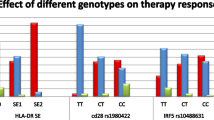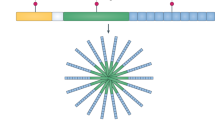Abstract
Rheumatoid arthritis (RA) is associated with autoantibodies, the best known of which is rheumatoid factor (RF). RF/IgG complexes interact with FcγR on the surface of neutrophils, NK cells and monocyte/macrophages. We have analyzed the expression pattern and allelic polymorphisms of three FcγR genes (FcγRIIA, FcγRIIC and FcγRIIIA) in a large sample of RA patients and normal donors. We have found that the level of FcγR (CD16 and CD32) expression on NK cells is lower in RA patients than in normal individuals. Genotypic analysis demonstrated that the CD32 isoform expressed by the majority of RA patients was not the activating FcγRIIc1 isoform, commonly seen in normal individuals, but rather the inhibitory FcγRIIb isoform. The combination of the FcγRIIIA-176F allele with a lack of CD32 expression in NK cells appeared to be characteristic of RA subjects with aggressive disease. Since FcγRII and FcγRIIIA are predominantly expressed by NK cells, these data further suggest that FcγR-mediated activation of NK cells could be a disease-determining factor in RA patients.
This is a preview of subscription content, access via your institution
Access options
Subscribe to this journal
Receive 6 digital issues and online access to articles
$119.00 per year
only $19.83 per issue
Buy this article
- Purchase on Springer Link
- Instant access to full article PDF
Prices may be subject to local taxes which are calculated during checkout



Similar content being viewed by others
References
Winchester R, Dwyer E, Rose S . The genetic basis of rheumatoid arthritis: the shared epitope hypothesis. Rheum Dis Clin North Am 1992; 18: 761–783.
Jouvenne P, Chaudhary A, Buchs N et al. Possible genetic association between interleukin-1α gene polymorphism and the severity of chronic polyarthritis. Eur Cytokine Netw 1999; 10: 33–36.
Brinkman BM, Huizinga TW, Kurban SS et al. Tumour necrosis factor alpha gene polymorphism in rheumatoid arthritis: association with susceptibility to, or severity of, disease? Br J Rheumatol 1997; 36: 516–521.
Moore TL, Dorner RW . Rheumatoid factors. Clin Biochem 1993; 26: 75–84.
Edwards JC, Cambridge G . Rheumatoid arthritis: the predictable effect of small immune complexes in which antibody is also antigen. Br J Rheum 1998; 37: 126–130.
Hendrich C, Kuipers JC, Kolanus W, Hammer M, Schmidt RE . Activation of CD16+ effector cells by rheumatoid factor complex. Arthritis Rheum 1991; 34: 423–431.
Qiu WQ, de Bruin D, Brownstein BH, Pearse R, Ravetch JV . Organization of the human and mouse low-affinity FcγR genes: evidence for duplication and recombination. Science 1990; 248: 732–735.
van de Winkel JGJ, Capel PJA . Human IgG Fc receptor heterogeneity: molecular aspects and clinical implications. Immunol Today 1993; 14: 215–221.
Metes D, Ernst LK, Chambers WH et al. Expression of functional CD32 molecules on human NK cells is determined by an allelic polymorphism of the FcγRIIC gene. Blood 1998; 91: 2369–2380.
Metes D, Manciulea M, Petrusca D et al. Ligand binding specificities and signal transduction pathways of FcγRIIc isoforms; the CD32 isoforms expressed by human NK cells. Eur J Immunol 1999; 29: 2842–2852.
Ernst LK, Metes D, Herberman RB, Morel PA . Allelic polymorphisms in the FcγRIIC gene can influence its function on normal human natural killer cells. J Mol Med 2002; 80: 248–257.
Salmon JE, Millard S, Schachter LA et al. Fc gamma RIIA alleles are heritable risk factors for lupus nephritis in African Americans. J Clin Invest 1996; 97: 1348–1354.
Sammaritano LR, Ng S, Sobel R et al. Anticardiolipin IgG subclasses: association of IgG2 with arterial and/or venous thrombosis. Arthritis Rheum 1997; 40: 1998–2006.
Wu J, Edberg JC, Redecha PB et al. A novel polymorphism of FcγRIIIa (CD16) alters receptor function and predisposes to autoimmune disease. J Clin Invest 1997; 100: 1059–1070.
Yee AM, Ng SC, Sobel RE, Salmon JE . FcγRIIA polymorphism as a risk factor for invasive pneumococcal infections in systemic lupus erythematosus. Arthritis Rheum 1997; 40: 1180–1182.
de Haas M, Koene HR, Kleijer M et al. A triallelic Fcγ receptor type IIIA polymorphism influences the binding of human IgG by NK cell FcγRIIIa. J Immunol 1996; 156: 2948.
Warmerdam PAM, van de Winkel JGJ, Gosselin EJ, Capel PJA . Molecular basis for a polymorphism of human Fcγ receptor II (CD32). J Exp Med 1990; 172: 19–25.
Warmerdam PAM, Nabben NMJM, van de Graaf SAR, van de Winkel JGJ, Capel PJA . The human low-affinity immunoglobulin G Fc receptor IIC is a result of an unequal crossover event. J Biol Chem 1993; 268: 7346.
van de Winkel JGJ, de Wit TPM, Ernst LK, Capel PJA, Ceuppens LJ . Molecular basis for a familial defect in phagocyte expression of IgG receptor I (CD64). J Immunol 1995; 156: 2896–2902.
Sanders LA, van de Winkel JG, Rijkers GT et al. Fc gamma receptor IIa (CD32) heterogeneity in patients with recurrent bacterial respiratory tract infections. J Infect Dis 1994; 170: 854–861.
Bredius RGM, Derkx BHF, Fijen CAP et al. Fcγ receptor IIa (CD32) polymorphism in fulminant meningococcal septic shock in children. J Infect Dis 1994; 170: 848–853.
Morgan AW, Keyte VH, Babbage SJ et al. FcγRIIIA-158V and rheumatoid arthritis: a confirmation study. Rheumatology 2003; 42: 528–533.
Milicic A, Misra R, Agrawal S et al. The F158V polymorphism in FcγRIIIA shows disparate associations with rheumatoid arthritis in two genetically distinct populations. Ann Rheum Dis 2002; 61: 1021–1023.
Nieto A, Caliz R, Pascual M et al. Involvement of Fcγ receptor IIIA genotypes in susceptibility to rheumatoid arthritis. Arthritis Rheum 2000; 43: 735–739.
Diaz de Stahl T, Andren M, Martinsson P, Verbeek JS, Kleinau S . Expression of FcγRIII is required for development of collagen-induced arthritis. Eur J Immunol 2002; 32: 2915–2922.
Nabbe KC, Blom AB, Holthuysen AE et al. Coordinate expression of activating Fcγ receptors I and III and inhibiting Fcγ receptor type II in the determination of joint inflammation and cartilage destruction during immune complex-mediated arthritis. Arthritis Rheum 2003; 48: 255–265.
Blom AB, van Lent PL, van Vuuren H et al. Fcγ R expression on macrophages is related to severity and chronicity of synovial inflammation and cartilage destruction during experimental immune-complex-mediated arthritis (ICA). Arthritis Res 2000; 2: 489–503.
Ji H, Ohmura K, Mahmood U et al. Arthritis critically dependent on innate immune system players. Immunity 2002; 16: 157–168.
Combe B, Dougados M, Goupille P et al. Prognostic factors for radiographic damage in early rheumatoid arthritis: a multiparameter prospective study. Arthritis Rheum 2001; 44: 1736–1743.
Visser H, le Cessie S, Vos K, Breedveld FC, Hazes JM . How to diagnose rheumatoid arthritis early: a prediction model for persistent (erosive) arthritis. Arthritis Rheum 2002; 46: 357–365.
Edwards SW, Hallett MB . Seeing the wood for the trees: the forgotten role of neutrophils in rheumatoid arthritis. Immunol Today 1997; 18: 320–324.
Pawlik A, Ostanek L, Brzosko I et al. FcγRIIa polymorphism in patients with rheumatoid arthritis. Clin Exp Rheumatol 2002; 20: 841–844.
Masuda M, Morimoto T, De Haas M et al. Increase of soluble FcγRIIIa derived from natural killer cells and macrophages in plasma from patients with rheumatoid arthritis. J Rheumatol 2003; 30: 1911–1917.
Metes D, Gambotto AA, Nellis J et al. Identification of the CD32/FcγRIIc-Q13/STP13 polymorphism using an allele-specific restriction enzyme digestion assay. J Immunol Meth 2001; 258: 85–95.
Su K, Wu J, Edberg JC, McKenzie SE, Kimberly RP . Genomic organization of classical human low-affinity Fcγ receptor genes. Genes Immun 2002; 3 (Suppl 1): S51–56.
Dalbeth N, Callan MF . A subset of natural killer cells is greatly expanded within inflamed joints. Arthritis Rheum 2002; 46: 1763–1772.
Kuipers JG, Hendrich C, Kolanus W, Hammer M, Schmidt RE . Activation of Fcγ receptor (CD16) positive natural killer cells by rheumatoid factors in rheumatoid arthritis. Immun Infect 1990; 18: 50–52.
McInnes IB, Liew FY . Interleukin 15: a proinflammatory role in rheumatoid arthritis synovitis. Immunol Today 1998; 19: 75–79.
McInnes IB, Leung BP, Sturrock RD, Field M, Liew FY . Interleukin-15 mediates T cell-dependent regulation of tumor necrosis factor-alpha production in rheumatoid arthritis. Nat Med 1997; 3: 189–195.
Tagaya Y, Bamford RN, DeFilippis AP, Waldmann TA . IL-15: a pleiotropic cytokine with diverse receptor/signaling pathways whose expression is controlled at multiple levels. Immunity 1996; 4: 329–336.
Salmon JE, Dalton WS . Relevance of multidrug resistance to rheumatoid arthritis: development of a new therapeutic hypothesis. J Rheumatol 1996; 44: 97–101.
Horwitz DA, Gray JD, Ohtsuka K, Hirokawa M, Takahashi T . The immunoregulatory effects of NK cells: the role of TGF-β and implications for autoimmunity. Immunol Today 1997; 18: 538–542.
Yen JH, Moore BE, Nakajima T et al. Major histocompatibility complex class I-recognizing receptors are disease risk genes in rheumatoid arthritis. J Exp Med 2001; 193: 1159–1167.
Kawanaka N, Yamamura M, Aita T et al. CD14+,CD16+ blood monocytes and joint inflammation in rheumatoid arthritis. Arthritis Rheum 2002; 46: 2578–2586.
Blom AB, Radstake TR, Holthuysen AE et al. Increased expression of FcγRII and III on macrophages of rheumatoid arthritis patients results in higher production of tumor necrosis factor α and matrix metalloproteinase. Arthritis Rheum 2003; 48: 1002–1014.
Morel PA, Feili-Hariri M, Coates PT, Thomson AW . Dendritic cells, T cell tolerance and therapy of adverse immune reactions. Clin Exp Immunol 2003; 133: 1–10.
Pettit AR, Thomas R . Dendritic cells: the driving force behind autoimmunity in rheumatoid arthritis? Immunol Cell Biol 1999; 77: 420–427.
Thomas R, Quinn C . Functional differentiation of dendritic cells in rheumatoid arthritis: role of CD86 in the synovium. J Immunol 1996; 156: 3074–3086.
Santiago-Schwarz F, Anand P, Liu S, Carsons SE . Dendritic cells (DCs) in rheumatoid arthritis (RA): progenitor cells and soluble factors contained in RA synovial fluid yield a subset of myeloid DCs that preferentially activate Th1 inflammatory-type responses. J Immunol 2001; 167: 1758–1768.
Schakel K, Kannagi R, Kniep B et al. 6-Sulfo LacNAc, a novel carbohydrate modification of PSGL-1, defines an inflammatory type of human dendritic cells. Immunity 2002; 17: 289–301.
Arnett FC, Edworthy SM, Bloch DA . The American Rheumatism Association 1987 revised criteria for the classification of rheumatoid arthritis. Arthritis Rheum 1988; 31: 315–324.
Morel PA, Chang HJ, Wilson J et al. Severe systemic sclerosis with anti-topoisomerase antibodies is associated with an HLA-DRw11 allele. Hum Immunol 1994; 40: 101–110.
Koene HR, Kleijer M, Algra J et al. FcγRIIIa-158V/F polymorphism influences the binding of IgG by natural killer cell FcγRIIIa, independently of the FcγRIIIa-48L/R/H phenotype. Blood 1997; 90: 1109–1114.
Jiang X-M, Arepally G, Pncz M, McKenzie SE . Rapid detection of the FcγRIIA-H/R131 ligand-binding polymorphism using an allele-specific restriction enzyme digestion (ASRED). J Immunol Meth 1996; 199: 55–59.
Acknowledgements
This work was supported by a grant awarded by the Simeon M Jones Jr and Katharine Reed Jones Fund of The Pittsburgh Foundation, and by NIH Grant AI42204. We would like to thank Dewayne Falkner and Jason Scull for technical assistance. We would also like to thank Drs Diana Metes and Russell Salter for critical reading of the manuscript.
Author information
Authors and Affiliations
Corresponding author
Rights and permissions
About this article
Cite this article
Stewart-Akers, A., Cunningham, A., Wasko, M. et al. FcγR expression on NK cells influences disease severity in rheumatoid arthritis. Genes Immun 5, 521–529 (2004). https://doi.org/10.1038/sj.gene.6364121
Received:
Revised:
Accepted:
Published:
Issue Date:
DOI: https://doi.org/10.1038/sj.gene.6364121
Keywords
This article is cited by
-
FcγRII and multi-system autoimmune disease
Springer Seminars in Immunopathology (2006)



